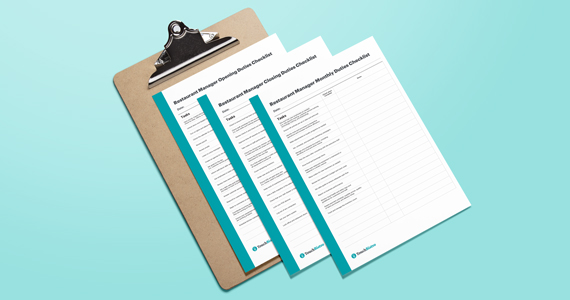Being a manager can be challenging, especially when it feels like everyone is depending on you (spoiler alert – they are!). But management is more than ticking off a to-do list: it’s about inspiring your team, being a mentor, and most importantly, about leadership.
When it comes to managing, the best of the bunch do the following.

Use these daily and monthly checklists to keep restaurant managers on track and operations running smoothly.
1. Jump in When Needed
This could be as simple as helping with side duties when a server’s shift runs late, cleaning restrooms, or running food, rather than standing by barking orders or hiding out in the office. It also means taking ownership of difficult customer service situations, and leading by example by working with a sense of urgency when it’s crunch time.
2. Jump Out When Not Needed
Helping out as a manager is an important part of being part of the team, but coddling and being overbearing isn’t helping anyone. Know when the team is doing fine on their own, so you can step back and manage the other parts of the show.
If you don’t know when to let your staff make decisions independently, you risk micromanaging them. Whatever the intention is behind micromanaging, one thing is certain: it’s not good for business. Here are some of the reasons it’s key to jump out when you’re not needed:
Opportunity Costs
Managers and owners don’t have time to oversee every little detail. When time is wasted micromanaging capable employees, you lose opportunities to improve the venue’s business by greeting customers, fixing errors, and enhancing marketing initiatives.
Loss of Staff Morale
When employees feel degraded and unable to perform their duties without constant criticism and demands, they will stop caring about their place of employment. They may even dread going to work. As staff morale is lost, employees may begin showing up late for work, ask to leave early, and half-ass their side duties. When your staff don’t feel appreciated it’s truly a lose-lose situation that has a direct impact on the success of your business.

Comparative Advantage
While some managers may be better at bartending or serving than their front-of-house staff, if they try to do those jobs themselves they will sink their business into the ground. For example, let’s say the venue is packed and five servers are on the floor. How could a manager oversee every small detail such as garnish types while simultaneously completing all the responsibilities associated with their role? They couldn’t!
Loss of Efficiency & Profit
When someone is constantly dictating what staff members can and cannot do, it’s hard for the staff to get things done as efficiently. In turn, they will lose valuable time that could have been spent taking orders, making drinks and turning tables. Not only will the venue lose money in missed opportunities and decreased efficiency, FOH staff will also lose tips they could have been making.

Use these daily and monthly checklists to keep restaurant managers on track and operations running smoothly.
High Employee Turnover
Hospitality is a fluid industry – staff members walk out, don’t show up, or quit without notice. If staff are micromanaged to a point of feeling disrespected and unhappy they won’t hesitate to quit as soon as they find another job or have had enough.
3. React Calmly
Keeping your calm and a cool demeanor makes you a reliable and trusted leader. When your staff is confident that you can handle any situation with ease, they’ll panic less and mirror your disposition – which makes for less craziness all around.

4. Listen
The power of listening creates trust in both your staff and guests. Put aside your own objectives – whether that be sales, or staffing schedules, or food cost – and hear what issues, problems, or suggestions your team has, to create a culture of acceptance. Not sure where to get started? Learn tips on how to listen to your employees and become a better leader by reading restaurant management books.
5. Decide with Confidence
As part of the restaurant general manager job description, on the spot decisions are a constant part of the job. Make sure that when you do have to choose, you do it knowing that it’s the right thing and stand firmly behind your decision. Sure, you might slip up now and again, but choosing with gumption will make you a powerhouse of efficiency.
By knowing when to help out, when to take your pedal off the gas, and by reacting calmly, listening closely, and making confident decisions, you can be a great manager and an excellent leader.

Use these daily and monthly checklists to keep restaurant managers on track and operations running smoothly.
Download your free employee handbook template
Subscribe to the TouchBistro Newsletter







